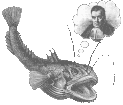UW Aquatic & Fishery Sciences Quantitative Seminar
Nis Sand Jacobsen
School of Aquatic and Fishery Sciences, University of Washington
Size based models as tools for an ecosystem approach to fisheries management.
Abstract
Ecosystem based fisheries management (EBFM) requires models that can simulate how fishing influences marine communities in regards to both direct and indirect effects. Size based models are a candidate framework to investigate long-term fishing strategies in EBFM. The models are based on individual level physiology and generally have a low set of parameters. Here I present two possible applications of size based models; 1) balanced harvesting has been suggested as an ecosystem wide fishing pattern that could potentially increase yields while conserving community structure. I show that both statements are true, but that the yield increase is marginal, and the consequence is a catch comprised of small fish with low economic value. 2) Fisheries are often associated with trade-offs (e.g., between yields and ecological objectives), which are enhanced at the ecosystem level. The optimal trade-off between these can be found by efficiency frontiers: the trade-off space where one objective cannot be improved without regressing another. I simulate the efficiency frontier between yields (biomass and economic) and an indicator of ecological state with novel calibrations of 5 large marine ecosystems, and show how management can improve on an ecosystem scale by considering indirect effects. Finally, I conclude on future directions and challenges related to the application of size based models.

